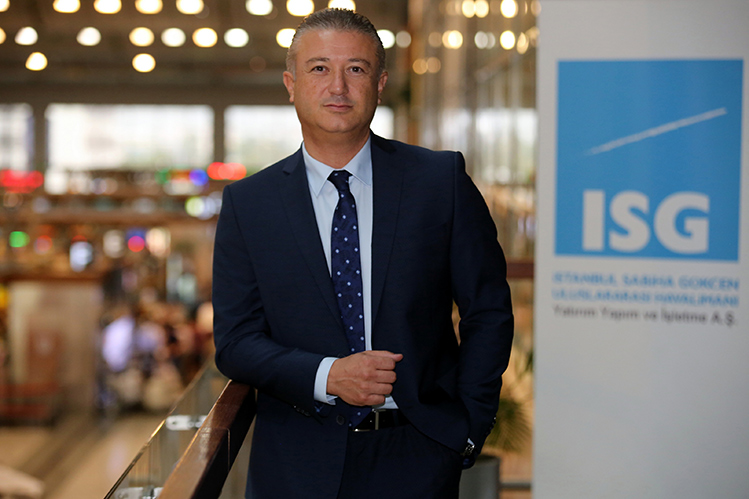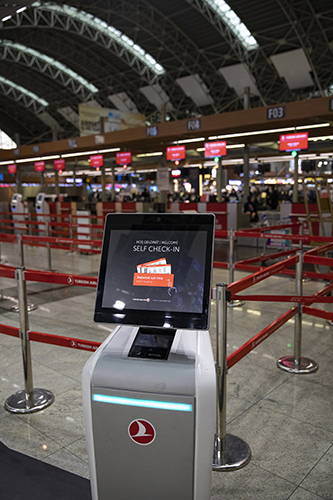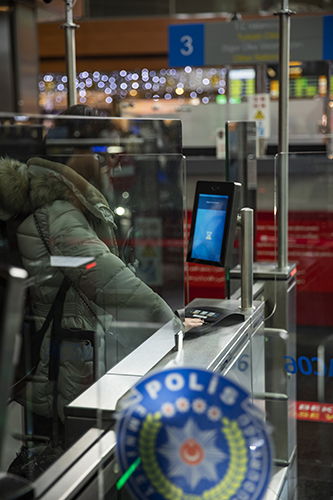An interview with Ersel Göral, CEO Istanbul Sabiha Gökçen International Airport. By Ross Falconer
The main strategy of Istanbul Sabiha Gökçen is to provide a seamless experience to travellers and become the preferred city airport. Progress towards achieving this goal has involved implementing time-saving services for passengers, especially with digital applications. One notable example is the e-passport gates that have been implemented to ease bottlenecks at border control. Passengers are now able to complete the process, stress-free, in under 30 seconds.

Ersel Göral, CEO Istanbul Sabiha Gökçen International Airport: “We continue to work on new digital projects and developments focusing on passenger health, safety and experience. Sabiha Gökçen, being the city airport of Istanbul, aims to provide passengers with an enhanced experience and support various stakeholders, including the airlines, in managing their operations more efficiently.”
“With the help of passenger flow tracking systems, we can track how crowds are moving across the airport, identify busy locations in real time, and produce alerts for the operations team to take immediate actions to solve the problems,” explains Ersel Göral, CEO Istanbul Sabiha Gökçen International Airport. “The information is also used for smart toilet cleaning. The cleaning resources are allocated based on usage. Besides operational excellence, the system also helps with monitoring social distancing, ensuring passenger health and safety.”
Another innovation is Aerobot – a robot that informs and reminds travellers about COVID-19 precautions at the airport. It also helps with flight schedule information and indoor navigation throughout the terminal.

In addition to health and safety measures, Istanbul Sabiha Gökçen International Airport has made a number of technological investments and innovations. Travellers can use self-check-in kiosks, self-bag-drop kiosks, mobile security checks, and mobile boarding.
Since flights resumed on 1 June 2020, following the COVID-19 related shutdown, Istanbul Sabiha Gökçen has continued to implement comprehensive measures to ensure the safety and well-being of passengers and employees.
“We were quick to comply with the requirements of the Pandemic Certification Programme, which the Directorate General of Civil Aviation introduced for all airport operators and other civil aviation organisations in Turkey,” says Göral. “First of all, as the terminal operator, we revised all procedures related to operations. As a preliminary precaution, only passengers and employees are accepted into the terminal, but no meeters and greeters. Then we commenced measuring the body temperature of all travellers and staff at the terminal entrances using thermal cameras.”
Social distancing measures include informative visuals, stickers and floor markings, which are reinforced with frequent announcements during peak hours.
“We have placed sanitizing stations at security checkpoints, and in common use areas, shops, gate areas and toilets, so that our passengers can maintain cleanliness and hygiene,” Göral adds. “We regularly clean and disinfect frequently-touched surfaces, such as plastic security screening trays, and do regular cleaning check-ups and maintenance of toilets. We established a hygiene team for this purpose.”
Meanwhile, the airport is ensuring proper air ventilation and is replacing filters in the air conditioning systems more frequently. Non-essential areas, such as smoking zones and children’s play areas, have been closed.
Digital transformation: investment and innovation
In addition to health and safety measures, Istanbul Sabiha Gökçen has made a number of technological investments and innovations. For example, due to the pandemic face-to-face communication is being minimised, with passengers preferring online solutions. “As the terminal operator, we offer Flash Pass and Meet & Assist services at the airport for our guests to proceed faster,” Göral explains. “At the terminal, our guests can use self-check-in kiosks, self-bag-drop kiosks, mobile security checks, and mobile boarding. Additionally, all conventional equipment has been repositioned and enriched with new functionalities to allow passengers to perform the processes themselves using their identity documents.”
Blockchain has been a vital element of the airport’s digital transformation. Istanbul Sabiha Gökçen uses a blockchain platform for information flow to its stakeholders in a fast and accurate way. “Blockchain allows us both to send out information instantly to our stakeholders and to verify the information being given,” Göral comments. “With this system, efficiency has increased in our workforce and on our stakeholders’ side. We have minimised human error with blockchain, automating many processes that were previously performed manually. The critical information shared among the stakeholders is now fully validated, accurate and real-time. Therefore, while getting rid of any delays, the time gained is the biggest positive aspect.”
“Inspiring trust” and showing “We Care”

Digital applications implemented by Istanbul Sabiha Gökçen International Airport include e-passport gates, which have eased bottlenecks at border control. Passengers are now able to complete the process, stress-free, in under 30 seconds.
The pandemic period allowed the airport to accelerate and complete maintenance work on its existing runway, as well as install additional check-in islands in the terminal. “Before the airport reopened on 1 June, we completed the cleaning and hygiene checks, the disinfection of all terminal facilities and HVAC (heating, ventilation and air conditioning) systems, and all necessary maintenance works,” says Göral. “All ICT (information communication technology) infrastructure and business continuity management practices have been fully simulated to ensure resilient, uninterrupted 24/7 operation.”
At Istanbul Sabiha Gökçen, the message to both employees and passengers throughout the crisis period has been focused on “inspiring trust”. “We used transparent and sincere language, and said ‘We Care’ to communicate all of the measures we implemented,” Göral explains. “In the period from 1 June to 1 November 2020, nearly 7.2 million passengers departed from our terminal to their chosen destinations. While many European airports have operated well below capacity, Istanbul Sabiha Gökçen was the busiest airport in Europe on 20 October.”
The airport expects to reach 18 million passengers by the end of this year – a decrease of 50% compared with 2019. Göral anticipates that the impact of the pandemic will still be felt early next year, but is optimistic that the Turkish civil aviation industry will experience a faster recovery than many other countries around the world. “Particularly for Istanbul Sabiha Gökçen, we do expect to get back to 2019 traffic levels as of 2022. We continue to work on new digital projects and developments focusing on passenger health, safety and experience. Sabiha Gökçen, being the city airport of Istanbul, aims to provide passengers with an enhanced experience and support various stakeholders, including the airlines, in managing their operations more efficiently.”







